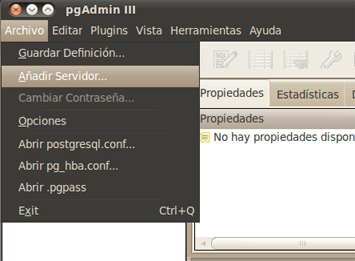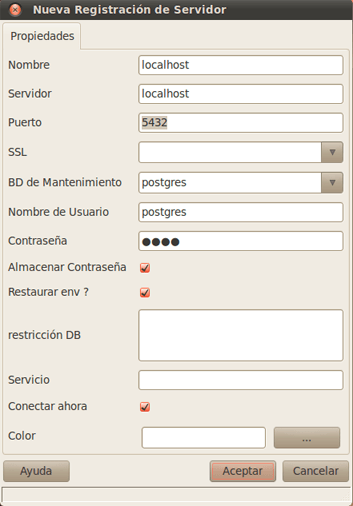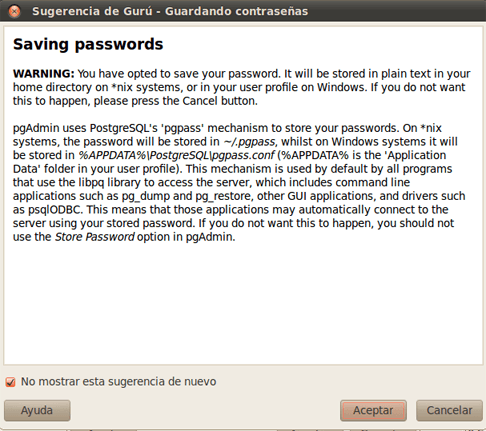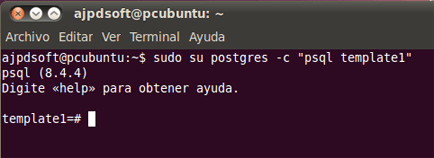Explicamos cómo instalar el motor de base de datos open source PostgreSQL en el sistema operativo GNU Linux Ubuntu 10. Explicamos cómo configurar PostgreSQL para permitir el acceso de los equipos de la LAN al servidor de PostgreSQL.
- Sobre PostgreSQL.
- Sobre el sistema operativo GNU Linux Ubuntu 10.
- Descargar e instalar PostgreSQL 8.4 en GNU Linux Ubuntu 10.
- Configurar PostgreSQL para permitir conexiones externas.
- Administración gráfica de PostgreSQL mediante pgAdmin III.
- Anexo.
- Artículos relacionados.
- Créditos.
Sobre el motor de bases de datos PostgreSQL
En el siguiente enlace podréis consultar información y características sobre PostgreSQL:
Sobre el sistema operativo GNU Linux Ubuntu 10
En el siguiente artículo explicamos cómo instalar el sistema operativo GNU Linux Ubuntu 10 virtualizado con VMware en Windows 7:
En este otro explicamos cómo instalar el sistema operativo GNU Linux Ubuntu 9 en un equipo con el sistema operativo Windows Server 2003 (quedando ambos sistemas operativos instalados y disponibles):
Descargar e instalar PostgreSQL 8.4 en GNU Linux Ubuntu 10
Necesitaremos disponer de conexión a Internet en el equipo con GNU Linux Ubuntu que será el servidor de PostgreSQL. Abriremos una ventana de terminal desde el menú "Aplicaciones" - "Accesorios" - "Terminal". Ejecutaremos el siguiente comando para instalar los componentes necesarios para PostgreSQL:
sudo apt-get install postgresql-8.4 postgresql-client-8.4 pgadmin3

Se iniciará la comprobación pertinente y nos pedirá confirmación para iniciar la instalación, escribiremos "s" y pulsaremos Intro:

Una vez instalado PostgreSQL, es recomendable cambiar la contraseña para el usuario que ha creado en GNU Linux llamado "postgres", para ello ejecutaremos el siguiente comando GNU Linux:
sudo passwd postgres
(primero nos pedirá la contraseña del usuario actual y después la del usuario "postgres")
Una vez cambiada la contraseña del usuario "postgres" del sistema operativo, comprobaremos que tiene el shell correcto, para ello ejecutaremos el comando GNU Linux:
sudo vipw
Nos mostrará el contenido del fichero /etc/passwd, buscaremos la línea donde aparezca el usuario postgres y nos aseguraremos de que al final tiene "/bin/bash":

Si hay que cambiarla, para guardar los cambios, pulsaremos la tecla Escape y las teclas ":wq" + INTRO.
Ahora comprobaremos que la instalación ha sido correcta, para ello accederemos a la consola de comandos de PostgreSQL, con el comando:
sudo su postgres -c "psql template1"
Si todo es correcto accederá a la consola de comandos de PostgreSQL:
Desde aquí podremos, por ejemplo, cambiar la contraseña al superusuario de la base de datos "postgres", algo recomendable por seguridad, para cambiarla ejecutaremos el siguiente comando PostgreSQL:
Si todo es correcto mostrará "ALTER ROLE":
Para salir de la línea de comandos de PostgreSQL pulsaremos "\q"
Configurar PostgreSQL para permitir conexiones externas
Si queremos que el resto de equipos de la red (o incluso desde Internet) puedan tener acceso a nuestro servidor de bases de datos PostgreSQL recién instalado, realizaremos la siguiente configuración:
1. Editaremos el fichero /etc/postgresql/8.4/main/postgresql.conf con el siguiente comando (o desde el modo gráfico):
sudo gedit /etc/postgresql/8.4/main/postgresql.conf
(podemos usar cualquier otro editor de textos como vi ó nano)
Buscaremos la línea:
#listen_addresses = 'localhost'
Y la sustituiremos por:
listen_addresses = '*'
Buscaremos también esta otra línea:
#password_encryption = on
Y la sustituiremos por:
password_encryption = on
Guardaremos los cambios realizados en el fichero postgresql.conf. Para que los cambios se apliquen reiniciaremos el servicio de PostgreSQL con el comando:
sudo /etc/init.d/postgresql-8.4 restart
Administración gráfica de PostgreSQL mediante pgAdmin III
Puesto que en la instalación de PostgreSQL hemos incluido pgadmin3, podremos usar esta herramienta de administración gráfica de PostgreSQL para realizar casi cualquier tarea de administración. Para abrirla accederemos al menú "Aplicaciones" - "Programación" - "pgAdmin III":

Accederemos al menú "Archivo" - "Añadir Servidor":

Introduciremos los datos:
- Nombre: nombre que identificará el servidor si tenemos varios en pgAdmin.
- Servidor: IP o nombre del servidor de PostgreSQL al que nos conectaremos.
- Puerto: puerto del servidor, por defecto 5432.
- Nombre de Usuario: nombre de usuario con permisos suficientes, por defecto "postgres".
- Contraseña: contraseña del usuario anterior.
- Almacenar Contraseña: si marcamos este check la contraseña se guardará para no volver a pedirla.

Si pulsamos "Aceptar" en la ventana anterior y hemos marcado "Almacenar Contraseña" nos mostrará un mensaje como este:

Con el siguiente texto:
Saving passwords
WARNING: You have opted to save your password. It will be stored in plain text in your home directory on *nix systems, or in your user profile on Windows. If you do not want this to happen, please press the Cancel button.
pgAdmin uses PostgreSQL's 'pgpass' mechanism to store your passwords.
On *nix systems, the password will be stored in ~/.pgpass, whilst on Windows systems it will be stored in %APPDATA%\PostgreSQL\pgpass.conf (%APPDATA% is the 'Application Data' folder in your user profile).
This mechanism is used by default by all programs that use the libpq library to access the server, which includes command line applications such as pg_dump and pg_restore, other GUI applications, and drivers such as psqlODBC. This means that those applications may automatically connect to the server using your stored password. If you do not want this to happen, you should not use the Store Password option in pgAdmin.
Indicando que la contraseña del usuario elegido se guardará en un fichero de texto plano, accesible por cualquier aplicación. Si estamos seguros pulsaremos "Aceptar" en la ventana anterior.
Haciendo clic sobre "localhost (localhost:5432" se conectará al servidor PostgreSQL y ya podremos administrarlo: crear roles de login, bases de datos, esquemas, catálogos, tablas, etc.:

Anexo
ajpdsoft@pcubuntu:~$ sudo apt-get install postgresql-8.4
postgresql-client-8.4 pgadmin3
[sudo] password for ajpdsoft:
Leyendo lista de paquetes... Hecho
Creando árbol de dependencias
Leyendo la información de estado... Hecho Se instalaron de forma automática los siguientes paquetes y ya no son necesarios.
linux-headers-2.6.32-21 linux-headers-2.6.32-21-generic Utilice «apt-get autoremove» para eliminarlos.
Se instalarán los siguientes paquetes extras:
libpq5 libwxbase2.8-0 libwxgtk2.8-0 pgadmin3-data pgagent postgresql-client-common
postgresql-common
Paquetes sugeridos:
libgnomeprintui2.2-0 postgresql-contrib oidentd ident-server
postgresql-doc-8.4
Paquetes recomendados
postgresql-client
Se instalarán los siguientes paquetes NUEVOS:
libpq5 libwxbase2.8-0 libwxgtk2.8-0 pgadmin3 pgadmin3-data pgagent
postgresql-8.4
postgresql-client-8.4 postgresql-client-common postgresql-common 0 actualizados, 10 se instalarán, 0 para eliminar y 0 no actualizados.
Necesito descargar 16,7MB de archivos.
Se utilizarán 48,4MB de espacio de disco adicional después de esta operación.
¿Desea continuar [S/n]? s
Des:1 http://es.archive.ubuntu.com/ubuntu/ lucid-updates/main libpq5
8.4.4-0ubuntu10.04 [80,9kB]
Des:2 http://es.archive.ubuntu.com/ubuntu/ lucid-updates/universe libwxbase2.8-0 2.8.10.1-0ubuntu1.2 [687kB]
Des:3 http://es.archive.ubuntu.com/ubuntu/ lucid-updates/universe libwxgtk2.8-0 2.8.10.1-0ubuntu1.2 [3459kB]
Des:4 http://es.archive.ubuntu.com/ubuntu/ lucid-updates/universe pgadmin3-data 1.10.2-1build1 [5535kB]
Des:5 http://es.archive.ubuntu.com/ubuntu/ lucid-updates/universe
pgadmin3 1.10.2-1build1 [2072kB]
Des:6 http://es.archive.ubuntu.com/ubuntu/ lucid/universe pgagent
3.0.1-1 [39,1kB]
Des:7 http://es.archive.ubuntu.com/ubuntu/ lucid/main postgresql-client-common 106 [52,2kB]
Des:8 http://es.archive.ubuntu.com/ubuntu/ lucid-updates/main
postgresql-client-8.4 8.4.4-0ubuntu10.04 [785kB]
Des:9 http://es.archive.ubuntu.com/ubuntu/ lucid/main postgresql-common 106 [88,3kB] Des:10 http://es.archive.ubuntu.com/ubuntu/ lucid-updates/main
postgresql-8.4 8.4.4-0ubuntu10.04 [3896kB] Descargados 16,7MB en 11s (1405kB/s) Preconfigurando paquetes ...
Seleccionando el paquete libpq5 previamente no seleccionado.
(Leyendo la base de datos ... 00%
149100 ficheros y directorios instalados actualmente.) Desempaquetando libpq5 (de .../libpq5_8.4.4-0ubuntu10.04_i386.deb) ...
Seleccionando el paquete libwxbase2.8-0 previamente no seleccionado.
Desempaquetando libwxbase2.8-0 (de
.../libwxbase2.8-0_2.8.10.1-0ubuntu1.2_i386.deb) ...
Seleccionando el paquete libwxgtk2.8-0 previamente no seleccionado.
Desempaquetando libwxgtk2.8-0 (de
.../libwxgtk2.8-0_2.8.10.1-0ubuntu1.2_i386.deb) ...
Seleccionando el paquete pgadmin3-data previamente no seleccionado.
Desempaquetando pgadmin3-data (de .../pgadmin3-data_1.10.2-1build1_all.deb) ...
Seleccionando el paquete pgadmin3 previamente no seleccionado.
Desempaquetando pgadmin3 (de .../pgadmin3_1.10.2-1build1_i386.deb) ...
Seleccionando el paquete pgagent previamente no seleccionado.
Desempaquetando pgagent (de .../pgagent_3.0.1-1_i386.deb) ...
Seleccionando el paquete postgresql-client-common previamente no seleccionado.
Desempaquetando postgresql-client-common (de
.../postgresql-client-common_106_all.deb) ...
Seleccionando el paquete postgresql-client-8.4 previamente no seleccionado.
Desempaquetando postgresql-client-8.4 (de
.../postgresql-client-8.4_8.4.4-0ubuntu10.04_i386.deb) ...
Seleccionando el paquete postgresql-common previamente no seleccionado.
Desempaquetando postgresql-common (de .../postgresql-common_106_all.deb) ...
Seleccionando el paquete postgresql-8.4 previamente no seleccionado.
Desempaquetando postgresql-8.4 (de
.../postgresql-8.4_8.4.4-0ubuntu10.04_i386.deb) ...
Procesando disparadores para doc-base ...
Processing 1 added doc-base file(s)...
Registering documents with scrollkeeper...
Procesando disparadores para man-db ...
Procesando disparadores para desktop-file-utils ...
Procesando disparadores para python-gmenu ...
Rebuilding /usr/share/applications/desktop.es_ES.utf8.cache...
Procesando disparadores para ureadahead ...
ureadahead will be reprofiled on next reboot Procesando disparadores para python-support ...
Configurando libpq5 (8.4.4-0ubuntu10.04) ...
Configurando libwxbase2.8-0 (2.8.10.1-0ubuntu1.2) ...
Configurando libwxgtk2.8-0 (2.8.10.1-0ubuntu1.2) ...
Configurando pgadmin3-data (1.10.2-1build1) ...
Configurando pgadmin3 (1.10.2-1build1) ...
Configurando pgagent (3.0.1-1) ...
Configurando postgresql-client-common (106) ...
Configurando postgresql-client-8.4 (8.4.4-0ubuntu10.04) ...
update-alternatives: usar /usr/share/postgresql/8.4/man/man1/psql.1.gz
para proporcionar /usr/share/man/man1/psql.1.gz (psql.1.gz) en modo automático
Configurando postgresql-common (106) ...
Adding user postgres to group ssl-cert
Building PostgreSQL dictionaries from installed myspell/hunspell packages...
en_au
en_ca
en_gb
en_us
en_za
es
Configurando postgresql-8.4 (8.4.4-0ubuntu10.04) ...
Creating new cluster (configuration: /etc/postgresql/8.4/main, data:
/var/lib/postgresql/8.4/main)...
Moving configuration file /var/lib/postgresql/8.4/main/postgresql.conf
to /etc/postgresql/8.4/main...
Moving configuration file /var/lib/postgresql/8.4/main/pg_hba.conf to /etc/postgresql/8.4/main...
Moving configuration file /var/lib/postgresql/8.4/main/pg_ident.conf
to /etc/postgresql/8.4/main...
Configuring postgresql.conf to use port 5432...
update-alternatives: usar
/usr/share/postgresql/8.4/man/man1/postmaster.1.gz para proporcionar /usr/share/man/man1/postmaster.1.gz (postmaster.1.gz) en modo automático
* Starting PostgreSQL 8.4 database server
[ OK ]
Procesando disparadores para libc-bin ...
ldconfig deferred processing now taking place
ajpdsoft@pcubuntu:~$ sudo passwd postgres
[sudo] password for ajpdsoft:
Introduzca la nueva contraseña de UNIX:
Vuelva a escribir la nueva contraseña de UNIX:
passwd: contraseña actualizada correctamente
ajpdsoft@pcubuntu:~$ cat /etc/passwd
root:x:0:0:root:/root:/bin/bash
daemon:x:1:1:daemon:/usr/sbin:/bin/sh
bin:x:2:2:bin:/bin:/bin/sh
sys:x:3:3:sys:/dev:/bin/sh
sync:x:4:65534:sync:/bin:/bin/sync
games:x:5:60:games:/usr/games:/bin/sh
man:x:6:12:man:/var/cache/man:/bin/sh
lp:x:7:7:lp:/var/spool/lpd:/bin/sh
mail:x:8:8:mail:/var/mail:/bin/sh
news:x:9:9:news:/var/spool/news:/bin/sh
uucp:x:10:10:uucp:/var/spool/uucp:/bin/sh
proxy:x:13:13:proxy:/bin:/bin/sh
www-data:x:33:33:www-data:/var/www:/bin/sh
backup:x:34:34:backup:/var/backups:/bin/sh
list:x:38:38:Mailing List Manager:/var/list:/bin/sh irc:x:39:39:ircd:/var/run/ircd:/bin/sh
gnats:x:41:41:Gnats Bug-Reporting System (admin):/var/lib/gnats:/bin/sh nobody:x:65534:65534:nobody:/nonexistent:/bin/sh
libuuid:x:100:101::/var/lib/libuuid:/bin/sh
syslog:x:101:103::/home/syslog:/bin/false
messagebus:x:102:107::/var/run/dbus:/bin/false
avahi-autoipd:x:103:110:Avahi autoip daemon,,,:/var/lib/avahi-autoipd:/bin/false
avahi:x:104:111:Avahi mDNS daemon,,,:/var/run/avahi-daemon:/bin/false
couchdb:x:105:113:CouchDB Administrator,,,:/var/lib/couchdb:/bin/bash
speech-dispatcher:x:106:29:Speech
Dispatcher,,,:/var/run/speech-dispatcher:/bin/sh
usbmux:x:107:46:usbmux daemon,,,:/home/usbmux:/bin/false haldaemon:x:108:114:Hardware abstraction layer,,,:/var/run/hald:/bin/false kernoops:x:109:65534:Kernel Oops Tracking Daemon,,,:/:/bin/false pulse:x:110:115:PulseAudio daemon,,,:/var/run/pulse:/bin/false
rtkit:x:111:117:RealtimeKit,,,:/proc:/bin/false
saned:x:112:118::/home/saned:/bin/false
hplip:x:113:7:HPLIP system user,,,:/var/run/hplip:/bin/false gdm:x:114:120:Gnome Display Manager:/var/lib/gdm:/bin/false ajpdsoft:x:1000:1000:AjpdSoft,,,:/home/ajpdsoft:/bin/bash
postgres:x:115:124:PostgreSQL administrator,,,:/var/lib/postgresql:/bin/bash
# -----------------------------
# PostgreSQL configuration file
# -----------------------------
#
# This file consists of lines of the form:
#
# name = value
#
# (The "=" is optional.) Whitespace may be used. Comments are introduced with # "#" anywhere on a line. The complete list of parameter names and allowed # values can be found in the PostgreSQL documentation.
#
# The commented-out settings shown in this file represent the default values.
# Re-commenting a setting is NOT sufficient to revert it to the default value; # you need to reload the server.
#
# This file is read on server startup and when the server receives a SIGHUP # signal. If you edit the file on a running system, you have to SIGHUP the # server for the changes to take effect, or use "pg_ctl reload". Some # parameters, which are marked below, require a server shutdown and restart to # take effect.
#
# Any parameter can also be given as a command-line option to the server, e.g., # "postgres -c log_connections=on". Some parameters can be changed at run time # with the "SET" SQL command.
#
# Memory units: kB = kilobytes Time units: ms = milliseconds
# MB = megabytes s = seconds
# GB = gigabytes min = minutes
# h = hours
# d = days
#------------------------------------------------------------------------------
# FILE LOCATIONS
#------------------------------------------------------------------------------
# The default values of these variables are driven from the -D command-line # option or PGDATA environment variable, represented here as ConfigDir.
data_directory = '/var/lib/postgresql/8.4/main' # use data in another directory
# (change requires restart)
hba_file = '/etc/postgresql/8.4/main/pg_hba.conf' # host-based
authentication file
# (change requires restart)
ident_file = '/etc/postgresql/8.4/main/pg_ident.conf' # ident configuration file
# (change requires restart)
# If external_pid_file is not explicitly set, no extra PID file is written.
external_pid_file = '/var/run/postgresql/8.4-main.pid' # write an
extra PID file
# (change requires restart)
#------------------------------------------------------------------------------
# CONNECTIONS AND AUTHENTICATION
#------------------------------------------------------------------------------
# - Connection Settings -
listen_addresses = '*'
# what IP address(es) to listen on;
# comma-separated list of addresses;
# defaults to 'localhost', '*' = all
# (change requires restart)
port = 5432 # (change requires restart)
max_connections = 100 # (change requires restart)
# Note: Increasing max_connections costs ~400 bytes of shared memory per # connection slot, plus lock space (see max_locks_per_transaction).
#superuser_reserved_connections = 3 # (change requires restart)
unix_socket_directory = '/var/run/postgresql' # (change requires restart)
#unix_socket_group = '' # (change requires restart)
#unix_socket_permissions = 0777 # begin with 0 to use octal notation
# (change requires restart)
#bonjour_name = '' # defaults to the computer name
# (change requires restart)
# - Security and Authentication -
#authentication_timeout = 1min # 1s-600s
ssl = true # (change requires restart)
#ssl_ciphers = 'ALL:!ADH:!LOW:!EXP:!MD5:@STRENGTH' # allowed SSL ciphers
# (change requires restart)
#ssl_renegotiation_limit = 512MB # amount of data between renegotiations
password_encryption = on
#db_user_namespace = off
# Kerberos and GSSAPI
#krb_server_keyfile = ''
#krb_srvname = 'postgres' # (Kerberos only)
#krb_caseins_users = off
# - TCP Keepalives -
# see "man 7 tcp" for details
#tcp_keepalives_idle = 0 # TCP_KEEPIDLE, in seconds;
# 0 selects the system default
#tcp_keepalives_interval = 0 # TCP_KEEPINTVL, in seconds;
# 0 selects the system default
#tcp_keepalives_count = 0 # TCP_KEEPCNT;
# 0 selects the system default
#------------------------------------------------------------------------------
# RESOURCE USAGE (except WAL)
#------------------------------------------------------------------------------
# - Memory -
shared_buffers = 28MB # min 128kB
# (change requires restart)
#temp_buffers = 8MB # min 800kB
#max_prepared_transactions = 0 # zero disables the feature
# (change requires restart)
# Note: Increasing max_prepared_transactions costs ~600 bytes of shared memory # per transaction slot, plus lock space (see max_locks_per_transaction).
# It is not advisable to set max_prepared_transactions nonzero unless you # actively intend to use prepared transactions.
#work_mem = 1MB # min 64kB
#maintenance_work_mem = 16MB # min 1MB
#max_stack_depth = 2MB # min 100kB
# - Kernel Resource Usage -
#max_files_per_process = 1000 # min 25
# (change requires restart)
#shared_preload_libraries = '' # (change requires restart)
# - Cost-Based Vacuum Delay -
#vacuum_cost_delay = 0ms # 0-100 milliseconds
#vacuum_cost_page_hit = 1 # 0-10000 credits
#vacuum_cost_page_miss = 10 # 0-10000 credits
#vacuum_cost_page_dirty = 20 # 0-10000 credits
#vacuum_cost_limit = 200 # 1-10000 credits
# - Background Writer -
#bgwriter_delay = 200ms # 10-10000ms between rounds
#bgwriter_lru_maxpages = 100 # 0-1000 max buffers written/round
#bgwriter_lru_multiplier = 2.0 # 0-10.0 multipler on buffers scanned/round
# - Asynchronous Behavior -
#effective_io_concurrency = 1 # 1-1000. 0 disables prefetching
#------------------------------------------------------------------------------
# WRITE AHEAD LOG
#------------------------------------------------------------------------------
# - Settings -
#fsync = on # turns forced synchronization on or off
#synchronous_commit = on # immediate fsync at commit
#wal_sync_method = fsync # the default is the first option
# supported by the operating system:
# open_datasync
# fdatasync
# fsync
# fsync_writethrough
# open_sync
#full_page_writes = on # recover from partial page writes
#wal_buffers = 64kB # min 32kB
# (change requires restart)
#wal_writer_delay = 200ms # 1-10000 milliseconds
#commit_delay = 0 # range 0-100000, in microseconds
#commit_siblings = 5 # range 1-1000
# - Checkpoints -
#checkpoint_segments = 3 # in logfile segments, min 1, 16MB each
#checkpoint_timeout = 5min # range 30s-1h
#checkpoint_completion_target = 0.5 # checkpoint target duration, 0.0 - 1.0
#checkpoint_warning = 30s # 0 disables
# - Archiving -
#archive_mode = off # allows archiving to be done
# (change requires restart)
#archive_command = '' # command to use to archive a logfile segment
#archive_timeout = 0 # force a logfile segment switch after this
# number of seconds; 0 disables
#------------------------------------------------------------------------------
# QUERY TUNING
#------------------------------------------------------------------------------
# - Planner Method Configuration -
#enable_bitmapscan = on
#enable_hashagg = on
#enable_hashjoin = on
#enable_indexscan = on
#enable_mergejoin = on
#enable_nestloop = on
#enable_seqscan = on
#enable_sort = on
#enable_tidscan = on
# - Planner Cost Constants -
#seq_page_cost = 1.0 # measured on an arbitrary scale
#random_page_cost = 4.0 # same scale as above
#cpu_tuple_cost = 0.01 # same scale as above
#cpu_index_tuple_cost = 0.005 # same scale as above
#cpu_operator_cost = 0.0025 # same scale as above
#effective_cache_size = 128MB
# - Genetic Query Optimizer -
#geqo = on
#geqo_threshold = 12
#geqo_effort = 5 # range 1-10
#geqo_pool_size = 0 # selects default based on effort
#geqo_generations = 0 # selects default based on effort
#geqo_selection_bias = 2.0 # range 1.5-2.0
# - Other Planner Options -
#default_statistics_target = 100 # range 1-10000
#constraint_exclusion = partition # on, off, or partition
#cursor_tuple_fraction = 0.1 # range 0.0-1.0
#from_collapse_limit = 8
#join_collapse_limit = 8 # 1 disables collapsing of explicit
# JOIN clauses
#------------------------------------------------------------------------------
# ERROR REPORTING AND LOGGING
#------------------------------------------------------------------------------
# - Where to Log -
#log_destination = 'stderr' # Valid values are combinations of
# stderr, csvlog, syslog and eventlog,
# depending on platform. csvlog
# requires logging_collector to be on.
# This is used when logging to stderr:
#logging_collector = off # Enable capturing of stderr and csvlog
# into log files. Required to be on for
# csvlogs.
# (change requires restart)
# These are only used if logging_collector is on:
#log_directory = 'pg_log' # directory where log files are written,
# can be absolute or relative to PGDATA
#log_filename = 'postgresql-%Y-%m-%d_%H%M%S.log' # log file name pattern,
# can include strftime() escapes
#log_truncate_on_rotation = off # If on, an existing log file of the
# same name as the new log file will be
# truncated rather than appended to.
# But such truncation only occurs on
# time-driven rotation, not on restarts
# or size-driven rotation. Default is
# off, meaning append to existing files
# in all cases.
#log_rotation_age = 1d # Automatic rotation of logfiles will
# happen after that time. 0 disables.
#log_rotation_size = 10MB # Automatic rotation of logfiles will
# happen after that much log output.
# 0 disables.
# These are relevant when logging to syslog:
#syslog_facility = 'LOCAL0'
#syslog_ident = 'postgres'
#silent_mode = off # Run server silently.
# DO NOT USE without syslog or
# logging_collector
# (change requires restart)
# - When to Log -
#client_min_messages = notice # values in order of decreasing detail:
# debug5
# debug4
# debug3
# debug2
# debug1
# log
# notice
# warning
# error
#log_min_messages = warning # values in order of decreasing detail:
# debug5
# debug4
# debug3
# debug2
# debug1
# info
# notice
# warning
# error
# log
# fatal
# panic
#log_error_verbosity = default # terse, default, or verbose messages
#log_min_error_statement = error # values in order of decreasing detail:
# debug5
# debug4
# debug3
# debug2
# debug1
# info
# notice
# warning
# error
# log
# fatal
# panic (effectively off)
#log_min_duration_statement = -1 # -1 is disabled, 0 logs all statements
# and their durations, > 0 logs only
# statements running at least this number
# of milliseconds
# - What to Log -
#debug_print_parse = off
#debug_print_rewritten = off
#debug_print_plan = off
#debug_pretty_print = on
#log_checkpoints = off
#log_connections = off
#log_disconnections = off
#log_duration = off
#log_hostname = off
log_line_prefix = '%t ' # special values:
# %u = user name
# %d = database name
# %r = remote host and port
# %h = remote host
# %p = process ID
# %t = timestamp without milliseconds
# %m = timestamp with milliseconds
# %i = command tag
# %c = session ID
# %l = session line number
# %s = session start timestamp
# %v = virtual transaction ID
# %x = transaction ID (0 if none)
# %q = stop here in non-session
# processes
# %% = '%'
# e.g. '<%u%%%d> '
#log_lock_waits = off # log lock waits >= deadlock_timeout
#log_statement = 'none' # none, ddl, mod, all
#log_temp_files = -1 # log temporary files equal or larger
# than the specified size in kilobytes;
# -1 disables, 0 logs all temp files
#log_timezone = unknown # actually, defaults to TZ environment
# setting
#------------------------------------------------------------------------------
# RUNTIME STATISTICS
#------------------------------------------------------------------------------
# - Query/Index Statistics Collector -
#track_activities = on
#track_counts = on
#track_functions = none # none, pl, all
#track_activity_query_size = 1024
#update_process_title = on
#stats_temp_directory = 'pg_stat_tmp'
# - Statistics Monitoring -
#log_parser_stats = off
#log_planner_stats = off
#log_executor_stats = off
#log_statement_stats = off
#------------------------------------------------------------------------------
# AUTOVACUUM PARAMETERS
#------------------------------------------------------------------------------
#autovacuum = on # Enable autovacuum subprocess? 'on'
# requires track_counts to also be on.
#log_autovacuum_min_duration = -1 # -1 disables, 0 logs all actions and
# their durations, > 0 logs only
# actions running at least this number
# of milliseconds.
#autovacuum_max_workers = 3 # max number of autovacuum subprocesses
#autovacuum_naptime = 1min # time between autovacuum runs
#autovacuum_vacuum_threshold = 50 # min number of row updates before
# vacuum
#autovacuum_analyze_threshold = 50 # min number of row updates before
# analyze
#autovacuum_vacuum_scale_factor = 0.2 # fraction of table size before vacuum
#autovacuum_analyze_scale_factor = 0.1 # fraction of table size before analyze
#autovacuum_freeze_max_age = 200000000 # maximum XID age before forced vacuum
# (change requires restart)
#autovacuum_vacuum_cost_delay = 20ms # default vacuum cost delay for
# autovacuum, in milliseconds;
# -1 means use vacuum_cost_delay
#autovacuum_vacuum_cost_limit = -1 # default vacuum cost limit for
# autovacuum, -1 means use
# vacuum_cost_limit
#------------------------------------------------------------------------------
# CLIENT CONNECTION DEFAULTS
#------------------------------------------------------------------------------
# - Statement Behavior -
#search_path = '"$user",public' # schema names
#default_tablespace = '' # a tablespace name, '' uses the default
#temp_tablespaces = '' # a list of tablespace names, '' uses
# only default tablespace
#check_function_bodies = on
#default_transaction_isolation = 'read committed'
#default_transaction_read_only = off
#session_replication_role = 'origin'
#statement_timeout = 0 # in milliseconds, 0 is disabled
#vacuum_freeze_min_age = 50000000
#vacuum_freeze_table_age = 150000000
#xmlbinary = 'base64'
#xmloption = 'content'
# - Locale and Formatting -
datestyle = 'iso, dmy'
#intervalstyle = 'postgres'
#timezone = unknown # actually, defaults to TZ environment
# setting
#timezone_abbreviations = 'Default' # Select the set of available time zone
# abbreviations. Currently, there are
# Default
# Australia
# India
# You can create your own file in
# share/timezonesets/.
#extra_float_digits = 0 # min -15, max 2
#client_encoding = sql_ascii # actually, defaults to database
# encoding
# These settings are initialized by initdb, but they can be changed.
lc_messages = 'es_ES.utf8' # locale for system error message
# strings
lc_monetary = 'es_ES.utf8' # locale for monetary formatting
lc_numeric = 'es_ES.utf8' # locale for number formatting
lc_time = 'es_ES.utf8' # locale for time formatting
# default configuration for text search
default_text_search_config = 'pg_catalog.spanish'
# - Other Defaults -
#dynamic_library_path = '$libdir'
#local_preload_libraries = ''
#------------------------------------------------------------------------------
# LOCK MANAGEMENT
#------------------------------------------------------------------------------
#deadlock_timeout = 1s
#max_locks_per_transaction = 64 # min 10
# (change requires restart)
# Note: Each lock table slot uses ~270 bytes of shared memory, and there are # max_locks_per_transaction * (max_connections + max_prepared_transactions) # lock table slots.
#------------------------------------------------------------------------------
# VERSION/PLATFORM COMPATIBILITY
#------------------------------------------------------------------------------
# - Previous PostgreSQL Versions -
#add_missing_from = off
#array_nulls = on
#backslash_quote = safe_encoding # on, off, or safe_encoding
#default_with_oids = off
#escape_string_warning = on
#regex_flavor = advanced # advanced, extended, or basic
#sql_inheritance = on
#standard_conforming_strings = off
#synchronize_seqscans = on
# - Other Platforms and Clients -
#transform_null_equals = off
#------------------------------------------------------------------------------
# CUSTOMIZED OPTIONS
#------------------------------------------------------------------------------
#custom_variable_classes = '' # list of custom variable class names
- Resultado ejecución comando: sudo /etc/init.d/postgresql-8.4 restart
ajpdsoft@pcubuntu:~$ sudo /etc/init.d/postgresql-8.4 restart
* Restarting PostgreSQL 8.4 database server [OK]
Artículos relacionados
- Artículos del Proyecto AjpdSoft sobre PostgreSQL.
- Instalar y administrar PostgreSQL en Microsoft Windows 7.
- Acceso al motor de base de datos PostgreSQL desde Windows XP con ODBC.
- Cómo crear un sitio web con secciones dinámicas con HTML, PHP, Delphi y MySQL.
- Cómo instalar MySQL Server 6.0 Alpha en Windows XP.
- Instalación y configuración de Windows XP Service Pack 3.
- Manual SQL (con ejemplos de sentencias SQL Oracle).
- Manual para instalar Oracle 9i en Windows con capturas de pantalla.
- Instalar Oracle Database 11g Standard Edition en Windows XP Profesional.
- Instalar Oracle Database 10g XE Express Edition en Windows XP.
- Instalar Oracle Database 10g Express Edition XE en Linux Ubuntu 6.06.
- Cómo acceder a una BBDD MS Access con Delphi sin utilizar código fuente.
- Instalar y administrar Microsoft SQL Server 2008 Express SP1.
- Consultas e informes desde Microsoft Access a Excel.
- Acceso a SQLite 3 mediante Delphi 6 y ZeosDBO en Windows XP.
- SQLite 3.6.11, instalación, configuración, acceso mediante ODBC.
- Definición URL.
- Definición SQL.
- Definición ODBC.
- Definición Mozilla Firefox.
- AjpdSoft Administración de base de datos.
- AjpdSoft Copia Seguridad MySQL.
- Artículos del Proyecto AjpdSoft sobre Microsoft Access.
- Artículos del Proyecto AjpdSoft sobre los sistemas operativos de Microsoft Windows.
- Foro de AjpdSoft sobre Windows, con trucos, dudas resueltas, solución a errores.




1 comentario:
Did you know that you can earn money by locking premium sections of your blog / site?
Simply open an account with AdWorkMedia and implement their content locking widget.
Publicar un comentario